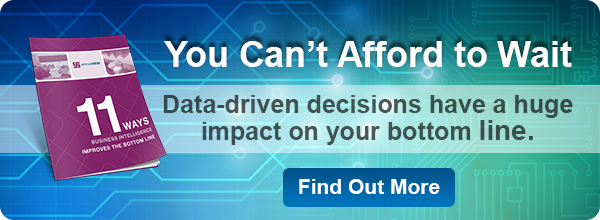 In a recent McKnight’s Senior Living article, the leaders of Argentum, NCAL, and LeadingAge responded to the question of their respective associations’ agendas for 2016. As I read their responses, I opportunely observed that Business Intelligence (BI) can help them effectively address these. For James Balda, President and CEO of Argentum (formerly the Assisted Living Facilities of America [ALFA]), the top issues are workforce development, quality care, operational excellence, and consumer choice. National Center for Assisted Living's (NCAL) Executive Director, Scott Tittle, reports that his organization’s top priorities involve state regulatory issues, workforce development, and, most significantly, “new tools that will help members accumulate data they can use to communicate the quality of care that they provide and to compare themselves with peer providers” with emphasis on quality outcomes. Katie Smith Sloan, President and CEO of LeadingAge, emphasized payment model changes, “whether it's ACOs or bundled payments or creating a network to negotiate with health plans.” A further concern, according to Ms. Sloan, is the lack of unit inventory, creating long waiting lists, and workforce development needs as well.
In a recent McKnight’s Senior Living article, the leaders of Argentum, NCAL, and LeadingAge responded to the question of their respective associations’ agendas for 2016. As I read their responses, I opportunely observed that Business Intelligence (BI) can help them effectively address these. For James Balda, President and CEO of Argentum (formerly the Assisted Living Facilities of America [ALFA]), the top issues are workforce development, quality care, operational excellence, and consumer choice. National Center for Assisted Living's (NCAL) Executive Director, Scott Tittle, reports that his organization’s top priorities involve state regulatory issues, workforce development, and, most significantly, “new tools that will help members accumulate data they can use to communicate the quality of care that they provide and to compare themselves with peer providers” with emphasis on quality outcomes. Katie Smith Sloan, President and CEO of LeadingAge, emphasized payment model changes, “whether it's ACOs or bundled payments or creating a network to negotiate with health plans.” A further concern, according to Ms. Sloan, is the lack of unit inventory, creating long waiting lists, and workforce development needs as well.
Taking license to read between the lines, all would likely agree that effective strategies require further research and that further research requires actionable information from reliable and timely data sources. This requires a robust data mining and business intelligence solution. Such a solution not only allows for the storage of critical data in data warehouses, but the retrieval, aggregation, and dissemination of such data converted to useful Key Performance Indicators (KPIs) which can be used internally or shared with other healthcare stake holders and investors.
Let’s take operational excellence, for example. Whether you call it “operational excellence” or “quality of care” perhaps, or positioning facilities to “negotiate with health plans”, having fresh, up-to-date information about the quality of clinical services, the costs to provide the services, and the labor required creates an advantage. Providers can respond to today’s issues today with an eye on the future. It also fosters the sharing of information that providers and their respective associations need to address these issues effectively. With BI, the information is already available and easily digestible.
How do you eat the elephants of workforce development, compliance, operational excellence, and payment model changes? One “byte” of data at a time. Accumulated and properly served, BI-generated KPIs can sustain such initiatives with energy and focus over the long haul.
Make Business Intelligence part of your 2016 strategic plan!

/Prime-Care-Technologies-Logo.png?width=191&height=55&name=Prime-Care-Technologies-Logo.png)


 In a recent McKnight’s Senior Living article, the leaders of Argentum, NCAL, and LeadingAge responded to the question of their respective associations’ agendas for 2016. As I read their responses, I opportunely observed that
In a recent McKnight’s Senior Living article, the leaders of Argentum, NCAL, and LeadingAge responded to the question of their respective associations’ agendas for 2016. As I read their responses, I opportunely observed that 